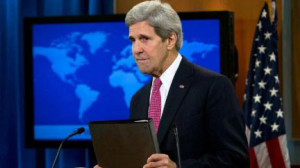
Secretary of State John Kerry
A copy of the report is posted on ICT’s website.
“The State Department’s extensive reporting on the situation in Tibet sheds needed light on a dark situation,” said Todd Stein, Director of Government Relations at the International Campaign for Tibet. “Released two days after Chinese authorities closed the Tibet Autonomous Region to foreigners, the Department’s report shows the harsh reality in Tibet that Chinese authorities are so desperately trying, and failing, to cover up.”
The Tibet section of the 2013 Human Rights Report provides a comprehensive account of human rights abuses suffered by Tibetans under a widespread crackdown imposed by Chinese policies and accelerated in the year since Xi Jinping became President. The report devotes special attention to the troubling new Chinese policies “that punish friends, relatives, and associates of self-immolators,” which has resulted in the sentencing of nearly 90 Tibetans (just in Qinghai and Gansu provinces), including a death sentence. In addition, it finds:
- Authorities continue to arbitrarily detain Tibetans for indefinite periods of time;
- Information and access to Tibetan areas is “strictly controlled;”
- The range of abuses in Tibet included “extrajudicial killings, torture, arbitrary arrests, extrajudicial detentions, and house arrests;”
- Despite the “autonomous” labeling of Tibetan areas, “Tibetans generally lacked the right to play a meaningful role in the protection of their cultural heritage and unique natural environment;” and
- “Economic and social exclusion” were significant drivers of discontent among Tibetans
The report confirms the Chinese pattern of hiding the effects of its policies in Tibet. It reveals that U.S. diplomatic personnel were denied access “multiple” times, including to Tibetan areas outside the Tibet Autonomous Region where permission was not officially required. Chinese officials “severely restricted travel by foreign journalists,” making independent reporting difficult. Travel agencies have reported that officials in the Tibet Autonomous Region stopped processing permits for foreign tourists to the Region on February 25 for a month-long period around “sensitive” anniversaries such as the March 10 Tibetan national day.
His Holiness the Dalai Lama was welcomed by President Obama in the White House on February 21 for the third time during his presidency. According to statements by the White House and the Central Tibetan Administration, the two discussed the human rights situation in Tibet and the need to preserve Tibet’s cultural, religious and linguistic heritage.
The separate Tibet section was mandated by Congress in 2002 to be included in the Country Reports on Human Rights, the Department’s annual assessment of human rights in each country.

